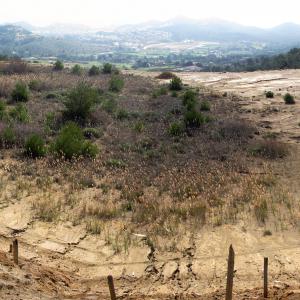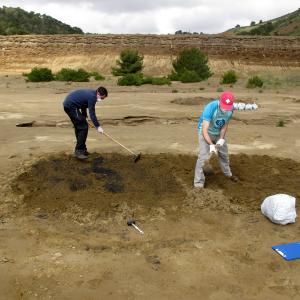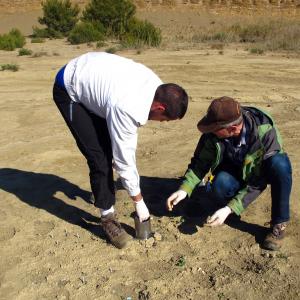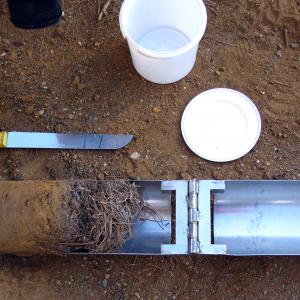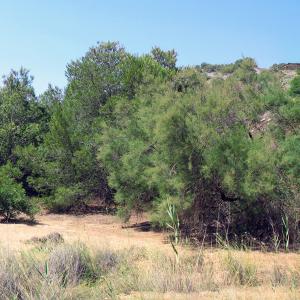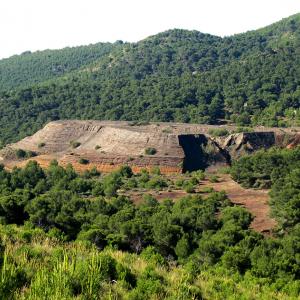
Ministerio de Economía y Competitividad
2017-2019
UPCT-UMU
The project aims at assessing to what extent changes in atmospheric CO2, temperature and soil moisture, based on IPCC predictions, might negatively affect the functionality and resilience of soils polluted by mining wastes under Mediterranean climate and if the application of some organic amendments (biochar and compost from urban solid wastes/sewage) might alleviate this damage.
The Intergovernmental Panel on Climate Change (IPCC) predicts increasing levels of atmospheric CO2 and air temperatures as well as decreasing soil moisture, the soils being among the most affected components of terrestrial ecosystems, especially in the Mediterranean area. Due to the importance of soil functions (organic matter/nutrient cycling, productivity, etc.), its response against such changes is crucial for assessing how terrestrial ecosystems might adapt and/or contribute to mitigate global warming. This adaptation capacity (resilience) depends on the soil status, at functional and structural level, the soils from degraded environments being less resilient. Among them are the soils from areas polluted by mining wastes which normally show stressful conditions for living organisms (extreme pHs, salinity, low organic matter content, high metal/metalloid concentrations, etc.). Since climate change might alter soil physical, chemical and biological properties, the negative impacts of mining wastes might worsen, further deteriorating the sustainability of polluted ecosystems. RESCLICONT aims at assessing to what extent changes in atmospheric CO2, temperature and soil moisture, based on IPCC predictions, might negatively affect the functionality and resilience of soils polluted by mining wastes under Mediterranean climate and if the application of some organic amendments (biochar and compost from urban solid wastes/sewage) might alleviate this damage. The specific objectives are: 1. Deepening into the functional (physical-biogeochemical aspects including microbiology and organic matter mineralization) and structural (types of organisms/microorganisms) knowledge of the edaphic niches from the mine tailings and its relation with plant colonization in order to understand in more detail the role of the soil as the main support for the spontaneous natural colonization of the ecosystem; 2. Assessing the resilience of the edaphic niches from the mine tailings against different scenarios of climate change, both at functional and structural level and trough changes in their toxicity; 3. Assessing the effect of organic amendment addition on the functional regeneration of the soil from the mine tailings and its resilience against different climate change scenarios, using the same approach than in objective 2. To achieve this goal, it will be performed a multidisciplinary Project which includes a field phase (Mining District of La Unión-Cartagena, SE Murcia Region) and an experimental phase to be done in controlled climate chambers where different scenarios of climate change will be simulated. In the first phase the soil biogeochemical, microbiological and biological behavior of different environments inside the mine tailings will be studied seasonally and the effect of the organic amendment addition will be evaluated for their regeneration under natural field conditions. In the second phase intact soil samples from the same field environments will be taken and subjected to controlled conditions of atmospheric CO2, temperature and soil moisture in order to evaluate their biogeochemical, microbiological and biological behavior against different scenarios of climate change. In addition, and after the exposition to controlled climate conditions, toxicity bioassays with plants and soil invertebrates will be carried out
PhD Thesis
Functional and ecotoxicological soil regeneration in abandoned metal(loid) mine tailings from semiarid Mediterranean environments spontaneously colonized by vegetation. Antonio Peñalver Alcalá. Doctorado Internacional por la UPCT del programa Técnicas Avanzadas en Investigación y Desarrollo Agrario y Alimentario (TAIDA).
PAPERS
Juan-Ovejero, R., Álvarez-Rogel, J., Peñalver-Alcalá, A., Verweij, R.A., van Gestel, C.A.M., González-Alcaraz, M.M. 2023. Microarthropod communities act as functional mediators of ecosystem recovery in abandoned metal(loid) mine tailings in semiarid areas. Science of the Total Environment 881 (2023) 163394. https://doi.org/10.1016/j.scitotenv.2023.163394
Álvarez-Rogel, J., Peñalver-Alcalá, A., González-Alcaraz, M.N. 2022. Spontaneous vegetation colonizing abandoned metal(loid) mine tailings consistently modulates climatic, chemical and biological soil conditions throughout seasons. Science of the Total Environment 838, 155945. https://doi.org/10.1016/j.scitotenv.2022.155945.
Peñalver-Alcalá, A., Álvarez-Rogel, J., Peixoto, S., Silva, I., Silva, A.R.R., González-Alcaraz, M.N. 2021. The relationships between functional and physicochemical soil parameters in metal(loid) mine tailings from Mediterranean semiarid areas support the value of spontaneous vegetation colonization for phytomanagement. Ecological Engineering 168, 106293. https://doi.org/10.1016/j.ecoleng.2021.106293
Peñalver-Alcalá, A., Álvarez-Rogel, J., Conesa, HM, González-Alcaraz, MN. 2021. Biochar and urban solid refuse ameliorate the inhospitality of acidic mine tailings and foster effective spontaneous plant colonization under semiarid climate. Journal of Environmental Management 292, 112824. https://doi.org/10.1016/j.jenvman.2021.112824
Álvarez-Rogel, J., Peñalver-Alcalá, A., Jiménez-Cárceles, F.J., Tercero, M.C., González-Alcaraz, M.N. 2021. Evidence supporting the value of spontaneous vegetation for phytomanagement of soil ecosystem functions in abandoned metal(loid) mine tailings. Catena 201, 105191. https://doi.org/10.1016/j.catena.2021.105191.
CONGRESESS
Authors: Jose Alvarez-Rogel, Antonio Peñalver Alcalá, María del Carmen Tercero Gómez, Héctor Miguel Conesa Alcaraz, Obdulia Martínez Oró, Francisco José Jiménez-Cárceles, Rudo A. Verweij, C.A.M. van Gestel, M. Nazaret González-Alcaraz. Title: Functional and structural soil‐vegetation indicators of ecosystem functioning in metal‐contaminated environments: a case study in SE Spain. POSTER. SETAC Europe 28th Annual Meeting. Rome (Italy). May 2018
Authors: Antonio Peñalver Alcalá, Jose Alvarez-Rogel, María del Carmen Tercero Gómez, M. Nazaret González-Alcaraz. Title: Decomposition rates and feeding activity of soil fauna in relation with stages of plant colonization in mine soils of a Mediterranean area. POSTER. SETAC Europe 28th Annual Meeting. Rome (Italy). May 2018
Authors: J. Álvarez-Rogel, H.M. Conesa Alcaraz, I. Párraga-Aguado, O. Martínez Oró, M.C. Tercero Gómez, A. Peñalver Alcalá, F.J. Jiménez-Cárceles, J.J. Martínez Sánchez, M.N. González-Alcaraz Title: Ecological impacts and ecosystem response in an old mining area of SE Spain: learning lessons for phytomanagement. POSTER. SETAC Europe 27th Annual Meeting. Brusels (Belgium). May 2017
Authors: Álvarez-Rogel, J., Peñalver AIcalá, A., Conesa Alcaraz, H.M., Martínez-Sánchez, J.J., Vicente Colomer M.J., van Gestel, C.A.M., Delgado Iniesta, M.J., Jiménez-Cárceles, F.J., González-AIcaraz M.N. Title: Funcionalidad y resiliencia de suelos en ambientes mediterráneos afectados por residuos mineros: objetivos y diseño experimental del proyecto RESCLICONT. POSTER. XXXI Reunión Nacional de Suelos de la SECS. Madrid (España). June 2017

